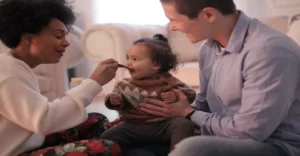The Holiday season is around the corner and it’s a time to spread cheer and happiness. However, for parents with kids on the Autism spectrum, it may also be a challenging time with children getting overwhelmed with sensory overload! So here are some tips to a hopefully stress free Holiday season.
Decorations
Decorations are beautiful but at the same time, some of them can lead to subtle sensory stimulation which over time may become too much for the children to handle.Some ideas to prevent this sensory overload:
- If you put on lights, try to get those which would stay on instead of blinking on and off.
- Ornaments that have glitter on them may reflect the tree lights and appear too bright for the child
- Same principle applies to tinsel – tree lights or other bright lights can give a blinding glare when they shine on the tinsel, making it very uncomfortable for a child sensitive to light. If you go for tinsel, hang it in moderation or away from bright lights.
- Decorations that make sound are OK as long as a person can have control on them, e.g. one that makes holiday music when a button/part is pressed is better than one that is activated by a sensor going off off when someone passes by.
- Give the child control by letting them help decorate the tree – it is fun for them and knowing that they put the decoration on decreases the surprise element from the sensory feedback they get. From a OT point of view, it is fine motor work too!
Shopping
- Try to get a head start on the shopping when most people have not started their Holiday shopping yet…it would give the children a crowd free outing.
- If you want to take the kids to the store to get an idea of what they’d like, go at a non-rush hour. This would give them the time to look at the toys/books etc. instead of getting distracted by the people/noise around them.
- There’s nothing wrong with shopping from catalogues/online!
Meals
With so many of our children having allergies, sensitivities to certain food items and others on special diets, it is important to make sure that only the right things are being given to the children. The simplest way is to tell family/friends not to feed your children anything. Or, ask them to check with you before giving anything to them to eat. It may be difficult at first but once people understand the importance of not changing the children’s dietary habits, they will stay on board with you.
Visiting family/friends
- Explain to the host before the visit that the child may get overwhelmed at some point because of new surroundings, lots of new people etc.
- The child may not be able to hug the other family members and that’s OK…when forced in a situation where a hug/kiss is expected for a cousin/grandparents and others, the child may do it but get so uncomfortable that his sensory overload behaviour would escalate. It would be preferable to just be polite and thank the person giving the present.
- If you find your child getting overwhelmed and acting out, find a quiet area or safe zone where he can calm down. Let the child as well as the family know that it not a time out…the child is not being punished for his behaviour but being helped to find someplace where he can calm his senses. In the end, it boils down to some adjustments… a little adjustment in expectations this season could lead to an important part of the year go by without many meltdowns.
And as time goes by you’ll see that your family and friends will soon learn what not to feed your children, while your children will slowly develop coping skills to handle all the sensory stimulation thrown at them during the Holidays.
We would love to hear if you have any special tricks that make this season easier for your children with Autism and other sensory challenges.











